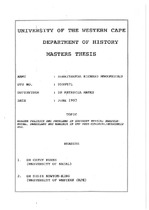| dc.contributor.advisor | Hayes, Patricia | |
| dc.contributor.author | Mngomezulu, Bhekithemba Richard | |
| dc.date.accessioned | 2021-09-20T12:04:07Z | |
| dc.date.available | 2021-09-20T12:04:07Z | |
| dc.date.issued | 1997 | |
| dc.identifier.uri | http://hdl.handle.net/11394/8469 | |
| dc.description | Magister Artium - MA | en_US |
| dc.description.abstract | The study of gender is crucial for the achievement and
sustainability of the democratic ethos in Southern Africa. The
substantial·literature in this field attests· to this notion1
'. It
could help us understand why certain gender stereotypes are
viewed by societies as given.rat could also help us explain such
problems as the unequal representation in most political
structures, and the gendered labour system!. In addition, as the
quotation a~ove suggests, the way we talk has gender connotations
of which most people are unaware. Many males however, distance
themselves from public debates on gender issues on the grounds
that gender is about women. | en_US |
| dc.language.iso | en | en_US |
| dc.publisher | University of Western Cape | en_US |
| dc.subject | Gender politics | en_US |
| dc.subject | Post-apartheid | en_US |
| dc.subject | Southern Africa | en_US |
| dc.subject | Inequality | en_US |
| dc.subject | Gender connotations | en_US |
| dc.subject | Gender relations | en_US |
| dc.title | Gender politics and problems in Southern Africa: KwaZulu-Natal, Swaziland and Namibia in the post-colonial/apartheid era. | en_US |
| dc.rights.holder | University of Western Cape | en_US |

